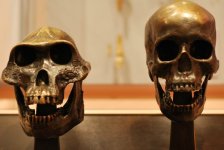For those who still thought of Neanderthals as brutish retards, think again. It was already known that they had bigger brains than us, they could talk, buried their dead long before Homo sapiens, used medicinal plants, made and used painting and jewellery, and that they may have invented religion. Now a new study published in Science provides evidence that their brains (and body in general) matured a bit more slowly than Sapiens brains, which means they had longer childhoods and were slightly more neotenised than us.
Neoteny (longer retention of juvenile traits) is what made it possible for humans to learn and keep a flexible brain until much later than other primates and consequently to develop technologies that made us rise above all other animals. This is also why very intelligent people tend to remain more childish and immature for longer (the quintessential example is Sheldon Copper in the TV show Big Bang Theory). It is not impossible that the gene for slower maturation of the brain was inherited from Neanderthals and that a part of the modern population carries the Neanderthal variant. East Asians for example do show signs of neoteny in their physical features (smaller nose, younger looking at equal age) and behaviour (obsession with cute things) that aren't as common in other populations.
BBC News: Neanderthal brains 'grew more slowly'
Neoteny (longer retention of juvenile traits) is what made it possible for humans to learn and keep a flexible brain until much later than other primates and consequently to develop technologies that made us rise above all other animals. This is also why very intelligent people tend to remain more childish and immature for longer (the quintessential example is Sheldon Copper in the TV show Big Bang Theory). It is not impossible that the gene for slower maturation of the brain was inherited from Neanderthals and that a part of the modern population carries the Neanderthal variant. East Asians for example do show signs of neoteny in their physical features (smaller nose, younger looking at equal age) and behaviour (obsession with cute things) that aren't as common in other populations.
BBC News: Neanderthal brains 'grew more slowly'


